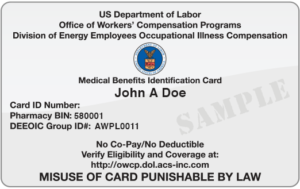In the early to mid-20th century, many government employees worked extensively with radioactive substances, especially in the U.S. nuclear weapons industry. Unfortunately, as a result of their exposure throughout the 1930s and 1940s, many employees became ill with radiological cancer. In response, the federal government enacted two laws, known as the Energy Employees Occupational Illness Compensation Program Act (EEOICPA) and the Radiation Exposure Compensation Act (RECA), both of which are intended to compensate those who became ill as a result of exposure to radioactive substances during nuclear testing. These programs provide free EEOICPA and RECA healthcare to those who qualify, so if you or a loved one were recently diagnosed with cancer and previously worked in or lived near a nuclear testing site or uranium mine, it is critical to speak with an experienced home health services provider who can ensure that you receive the medical care that you deserve.
Sources of Radiological Cancer
In today’s day and age, we are surrounded by substances that can cause serious medical conditions, including cancer. Exposure to radiation has proven to be especially dangerous, although in prior decades, little was known about the extent of the dangers posed by radiological substances. For this reason, thousands of people were exposed to deadly levels of radiation during nuclear testing, while working in uranium mines, or while living downwind of a testing facility. While these types of exposures did and do cause cancer, there are a number of other ways that a person can become ill with radiological cancer, which can make it difficult for those who are stricken with the condition to discover how and when they were exposed. For instance, high levels of radiation can be found in x-rays and CT scans and while precautions are now taken to help prevent excessive exposure to patients and medical professionals, this wasn’t always the case. For this reason, many elderly people who worked in an around these types of imaging systems later found themselves suffering from radiation-induced illnesses.
Occupational Exposure
Free EEOICPA and RECA healthcare is only offered to those who became ill with radiological cancer because they worked with radon, plutonium, uranium or other heavy metals, all of which contain high levels of radiation and so pose a risk to miners and nuclear power plant operators. Because it can be so difficult to determine where radiation exposure occurred, the EEOICPA program allows those who have been diagnosed with radiogenic cancer, chronic silicosis, beryllium sensitivity, or chronic beryllium disease to begin collecting benefits without proving that they were exposed to radiation, as long as they can prove that they worked at a covered DOE facility, for an atomic weapons employer, or for a beryllium vendor during specific time periods and in a position where they were exposed to dangerous chemicals and toxins.
Similarly, a person can become eligible for RECA benefits without having to prove where they were exposed to radiation if they can demonstrate that they suffer from a covered cancer and:
- Worked as a uranium miner, miller, or ore transporter;
- Were exposed to radiation because they lived downwind from a nuclear testing site or a uranium mine; or
- Were onsite nuclear test participants.
Additionally, claimants will need to provide written medical documentation, including screenings, referrals, and follow-up services to prove that they suffer from a covered condition.
Free EEOICPA and RECA Healthcare
To learn more about the services that we provide, please contact us at United Energy Workers Healthcare and Four Corners Health Care today. Our team is prepared to help you however we can.
Who We Serve
Do you have this card?

If you already have this card, then you are already approved to receive no-cost medical benefits! Call us to get started today.
In order to be eligible for EEOICPA/RECA benefits, an individual must have been employed at a covered Department of Energy facility, an approved atomic weapons facility, or at a permitted beryllium vendor. An individual must also have one of the covered conditions as a result of exposure to radiation, beryllium, or silica while employed at an accepted facility. In addition, uranium miners, millers, and ore transporters are eligible for benefits if they develop an illness as a result of exposure to toxic substances (such as radiation, chemicals, solvents, acids, and metals) and worked at a facility covered under RECA. Eligibility requirements vary by location and condition.